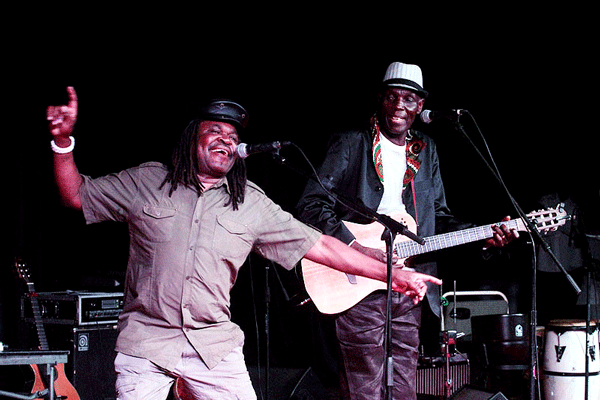
Two weeks ago, when I wrote asking the whereabouts of Patrick Mukwamba, I was overwhelmed with feedback from readers in Harare and Rusape, including a call from Mukwamba himself. When he called he was at a funeral of his brother Clive, who had been murdered in Marondera.
In the Groove with Fred Zindi

I later met Mukwamba at a Harare hotel where we talked about many issues, including the Zimbabwe Music Rights Association (Zimura)’s lack of protection for musicians’ stolen songs as his material such as his 1985 song, Usanyare Basa Raunoita, was allegedly used without payment by one Mawoko, a drama producer.
I also received another call from Steve Makoni in Rusape, who had also seen the article. He informed me that he knew Constable Chikwinji and was going to get my identity document from her. Makoni is a known comedian, so I took his story with a pinch of salt. However, his call gave me an opportunity to interview him as well, as I was also looking for him.
In case you don’t know who Makoni is, he is a singer, songwriter and solo guitarist. He is perhaps best known for his hit Sabhuku Nedhongi. In music circles, he is often referred to as “Dhongi” due to the overwhelming response Sabhuku Nedhongi received from the public.
I asked him for an update on his recent musical activities since 2009 when we last heard his politically-inspired song, Mambo Haagadzwe ne Mutorwa, which had poignant lyrics. This song received a lot of airplay on local radio stations to the extent that Makoni became Zimura’s highest royalties’ earner for that year.
Born in Nyanga in the early 1950s, Makoni became a well-known and powerful musician in the 1990s when he penned and sang the pro-woman-empowerment song, Handiende, which is a song about a wife telling her husband that although he no longer loved her, she was not going anywhere as she would remain in the marriage for the sake of her kids.
His comic take on realistic issues made him even more popular. Another song he is well-known for is his 1994 Zvachonyana from the album Risati Ravira, which is about the realities and exaggerations of love. The song goes something like this: Kana usipo, handirare, kana usipo handidye, asi apedza hupfu ndiyani? (In your absence my love, I can’t sleep and I won’t eat, but then who is finishing the food in the kitchen?)
- Chamisa under fire over US$120K donation
- Mavhunga puts DeMbare into Chibuku quarterfinals
- Pension funds bet on Cabora Bassa oilfields
- Councils defy govt fire tender directive
Keep Reading
I wanted to find out from Makoni whatever happened to his much-talked about album titled Munyibho, which he was rumoured to have collaborated with Oliver Mtukudzi and was set to be released in March 2014. He told me that the project had been put on hold because “it was becoming increasingly difficult to travel to Harare from my base in Rusape, due to many engagements at private functions, some of which were organised by Delta Beverages, but the album will finally be released in November”.
At the beginning of the year, Makoni was busy with preparations to travel to the United Kingdom where he performed alongside Thomas “Mukanya” Mapfumo and Progressive Teachers’ Union of Zimbabwe (PTUZ)’s Raymond Majongwe at a show dubbed Zimbabwe Independence Chimurenga Bira Festival at Corah Suite, Euro House in Leicester in April. He says the function was well-attended and he received a very good reception there.
If the album Munyibho is released as promised, this won’t be Makoni’s first encounter in song with the Mtukudzi family. In 1994, Tuku did Makoni’s epic hit song Handiende on his Ndega Zvangu album. Selmor Mtukudzi and her husband, Tendai Manatsa also did the same song a decade later.
Not only are Makoni’s songs laced with comedy, but he is also full of comic drama. One evening in 1990, at Skyline Hotel in Harare, I attended a concert by the Runn Family Band which had come from Mutare and had released a song called Hatichina Wekutamba Naye (We no longer have a friend to play with). This was a song about the death of Mozambique’s first president, Samora Machel who had died with 34 others in a plane crash along the South African border in 1986. As Peter Mparutsa of The Runn Family Band was on stage singing that song, Makoni went to the stage, grabbed the microphone from Mparutsa and screamed, “Tibvire apa. Ndiwe ani anoimba Hatichina Wekutamba Naye. Une zera na Samora Machel iwe? Unotamba naye pakudii?” (Get away, Peter! Why do you sing “we are left with no friend to play with”? Are you of the same age as Samora Machel? How dare you want to play with someone much older than you?) The crowd, which was in a sombre mood as the song progressed, suddenly burst into laughter. Makoni felt triumphant after his comic act and the crowd applauded him. That is Makoni for you.
Together with Bob Nyabinde, who is also full of comedy in his act, they are scheduled to perform in Harare and Masvingo soon. If I get another opportunity to watch them live, I certainly won’t miss these two artists from the Eastern Highlands.
Feedback: [email protected]











